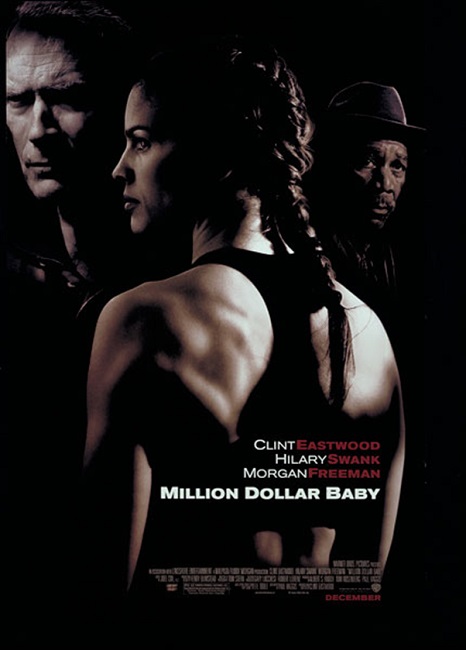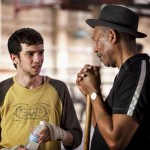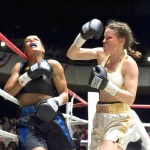
Million Dollar Baby – 2004
It is time to scale things back again. Million Dollar Baby is a film that comes back down to reality. No big special effects spectacle. No huge cast of characters. Just a good story told in a very down-to-earth way. On the surface this movie might look like a movie about boxing, and while that is certainly an important and integral part of the plot, it is about much, much more.
Clint Eastwood and Morgan Freeman are together again. The previous Best Picture winner that they both happened to be in was Unforgiven, 12 years before in 1992. Hillary Swank was a newcomer to Hollywood, and she did a fine job. There were really no other big names in the movie.
Eastwood played the character of Frankie Dunn, a boxing trainer that is a great coach, but is only marginally successful with his boxers. He is too cautious. He has a habit of keeping his fighters away from matches in which they might get hurt. He never takes any risks, and so his boxers never achieve great success. Freeman plays Eddie “Scrap-Iron” Dupris, an ex-boxer who has lost the use of one of his eyes and is now a janitor of the boxing gym that Dunn owns. Frankie becomes depressed after his prize contender leaves him for a manager who will be more aggressive in getting him a shot at a title bout.
In comes Maggie Fitzgerald, played by Hillary Swank. She is a poor girl from a white-trash home who wants a chance to make something of herself. She wants to have her moment in the sun, doing something that she loves to do. She wants to become a professional boxer in the WBA. After some hard coaxing from Scrap, Frankie grudgingly takes Maggie on and becomes her trainer and manager.
It turns out that Maggie is a natural, and with Frankie’s expert training, she starts working her way toward a title fight. Now, here is where the real emotional content of the film becomes apparent. Frankie has a skeleton in his closet. He has a daughter from whom he is estranged. He writes her letters every week, and every single one of them is returned. The movie never explains what happened between him and his daughter, but it is made clear that he harbors very deep regrets. During the training process, Frankie develops a paternal bond with Maggie, seeing in her the spirit of the daughter with whom he desperately desires to reconcile.
On the flip side, Maggie’s father died when she was young, and her white-trash mother never developed the parental connection needed to help her in any way. So, Maggie becomes fiercely loyal to Frankie as well. But true to form, Frankie begins to turn down opportunities for Maggie’s boxing career to advance, fearing for her safety.
Interesting note: At one point in the film, Frankie gives Maggie a nickname in Gaelic, playing up her Irish Heritage, which the fans chant. He called her Mo Cuishle. However, in reality, the phrase is spelled wrong. It should be Mo Chuisle.
Both Eastwood and Swank did a good job in their roles. Eastwood really surprised me by showing a softer side than I ever remember seeing him display. His character even broke down into tears at one point, something I have never seen the actor do in any of his films. Swank was a relative unknown at the time and even today, I am not familiar with any of her work. She did a great job and it was obvious that she and Eastwood had a good on-screen chemistry.
One complaint I have about Eastwood, and I must admit that this seems to be a characteristic of his acting style, in general, is the way he speaks. The sound is a soft, raspy sound that is almost like a trademark for him, but as he gets older, it becomes more and more difficult to understand him at times. And I know that he doesn’t have to sound that way. It is a choice. I know this because on the DVD, he included a four-way interview between himself, Swank, Freeman, and the interviewer, James Lipton, known for his television program Inside the Actor’s Studio. In this interview, Eastwood spoke clearly and without his typical rasp. That was his normal speaking voice. But for some reason he chose to make himself sound old and rough. But now that I consider it, maybe that was the point. Hmmm…
Another interesting choice Eastwood made, this as the film’s director, though the screenwriter, Paul Haggis, had to have been the first person behind it, was to have the character of Scrap doing narration throughout the film. And as we all know, Freeman has that natural gift of making nearly everything he says sound deep and meaningful. It is an uncanny thing with him and it has the effect of making everything sound incredibly interesting. In the end, it is revealed that all of Scrap’s narration is a letter to Frankie’s estranged daughter.
One of the major themes of the film, a phrase that Frankie keeps repeating to Maggie over and over again is ‘protect yourself at all times.’ This seemed to be Frankie’s mantra, but as I watched the film, I realized that he didn’t just mean in the ring. He meant it for life in general, which only served to emphasize his overly caution attitude as a boxing manager.
Eastwood set the viewers up to expect the movie to be about Maggie’s boxing career, like a female Rocky, being the underdog and triumphing over her personal demons to touch greatness. But it was the twist in the tragic ending of the movie that caused most viewers to say that it was one of the most depressing movies ever made. And it really was. However, I was a little cheated. Even though I had never seen the movie, I already know what the plot twist was. I knew the tragedy and saw it coming, though not the whole tragedy. I was not as emotionally slammed as I should have been.
Lucia Rijker played the part of the Welterweight Champion Billie ‘The Blue Bear’. She was defending her title, but she was a dirty fighter. She blatantly broke as many rules as she could get away with. One would think that any boxer who was given warning after warning for rule-breaking would be banned from the sport. But one of the cheap tricks she pulled was to attack Maggie after the stopping bell had rung and Maggie’s guard was down. She punched her so hard that she fell down.
Now here is the real spoiler alert. She fell and broke her neck on an overturned wooden stool. She became permanently paralyzed from the neck down, ending her career, her hopes, her dreams and her life outside of a hospital bed. She could no longer even breath on her own. Frankie cared for her and stayed with her at the hospital, all the while feeling that he was responsible for her injury. As the audience, we all know that he was not to blame. But it is also so easy to see how he could fall into that trap of blaming himself.
I wanted to know what happened to the other boxer as her rule breaking almost turned into murder. Now would she be banned from boxing? But the movie never said what happened to her. It was the final ending that took me by surprise.
The plot made it clear that Frankie was a very religious man. As many people do, he struggled with his faith, earnestly praying for reconciliation with his daughter and for Maggie’s safety. He got neither of those things. Who would not have their doubts? So when Maggie asks him to euthanize her, he initially refuses. But after her suicide attempts, (she tried biting her own tongue and chocking herself on the blood…) he realized that that she was suffering intolerably and wanted to die. She explained that she had no regrets and was grateful that she’d had her moment in the spotlight.
At this point I sympathized with her. I’m not sure if I believe in euthanization. But on some level, I do believe in a person’s right to choose their own path, even if that path leads to death. But that is a whole different discussion. Anyway, that is enough plot analysis for now.
Another thing about the movie that caught my attention was the music. Much like the movie Unforgiven, the music was this kind of soft and gently played guitar music that had a very melancholy edge to it, despite the violent nature of the story being told. According to the credits, Clint Eastwood, himself, wrote the music. Who knew that he was a musician as well? It was beautiful and slightly haunting music that fit the end of the film, but not necessarily the beginning and middle.
I don’t really have any big complaints about the movie at all, though there is one thing I don’t understand. The film was nominated for 7 Academy Awards, and took home 4 of them. In addition to best Picture, it won for Best Director (Eastwood), Best Actress (Swank), and Best Supporting Actor (Freeman). I have to ask the question: Why did Morgan Freeman win? I’m not saying he didn’t deserve it. He is a very good actor and he did a fine job in his performance. But the role itself just wasn’t worthy of the award. He didn’t do much, didn’t really affect the course of the plot much, and didn’t have much opportunity to show off any above-the-bar acting skills. So, why did he win?
The Character of Scrap was like an outside observer to the story taking place. He commented on it and narrated it, but honestly, he could have been easily written out of the movie and it would have had just as great an emotional impact. He only had one memorable scene in which he sees a somewhat mentally handicapped boy being abused and used as a punching-bag by a real asshole. He is tricked into being in another room while the asshole does this horrible thing. Scrap puts on one boxing glove and raises his fists, inviting the asshole to fight ‘the old man’. Of course, in a most satisfying way, he not only knocks the asshole out cold, you see a tooth roll out onto the mat.
But that scene was only a very small sub-plot. It didn’t need to be there to make the movie what it was. Freeman was up against veteran actor Alan Alda in The Aviator, Thomas Hayden Church in Sideways, Jamie Fox in Collateral and Clive Owen in Closer. The only one of those films I saw was Sideways, but that was enough. Church’s role allowed him to show off a greater emotional range and depth of character than Freeman. But, the Academy apparently saw something I did not.
Aside from that minor little issue, I thought it was a good movie, though it wasn’t my favorite Best Picture winner. Did it deserve the award? Sure, why not? But I’ve never been a huge fan of Clint Eastwood or boxing. It moved pretty slow and had surprisingly few scenes that took place in the ring, which might have made it a little more interesting. Well… they had some but they were very short scenes that were over very quickly, so I didn’t have time to get very excited by them. One of Maggie’s problems as a competitive boxer was that she would knock out her opponents in seconds and win very quickly without giving the audience the chance to get into the sport aspect of the film.
But like I said, why not?








